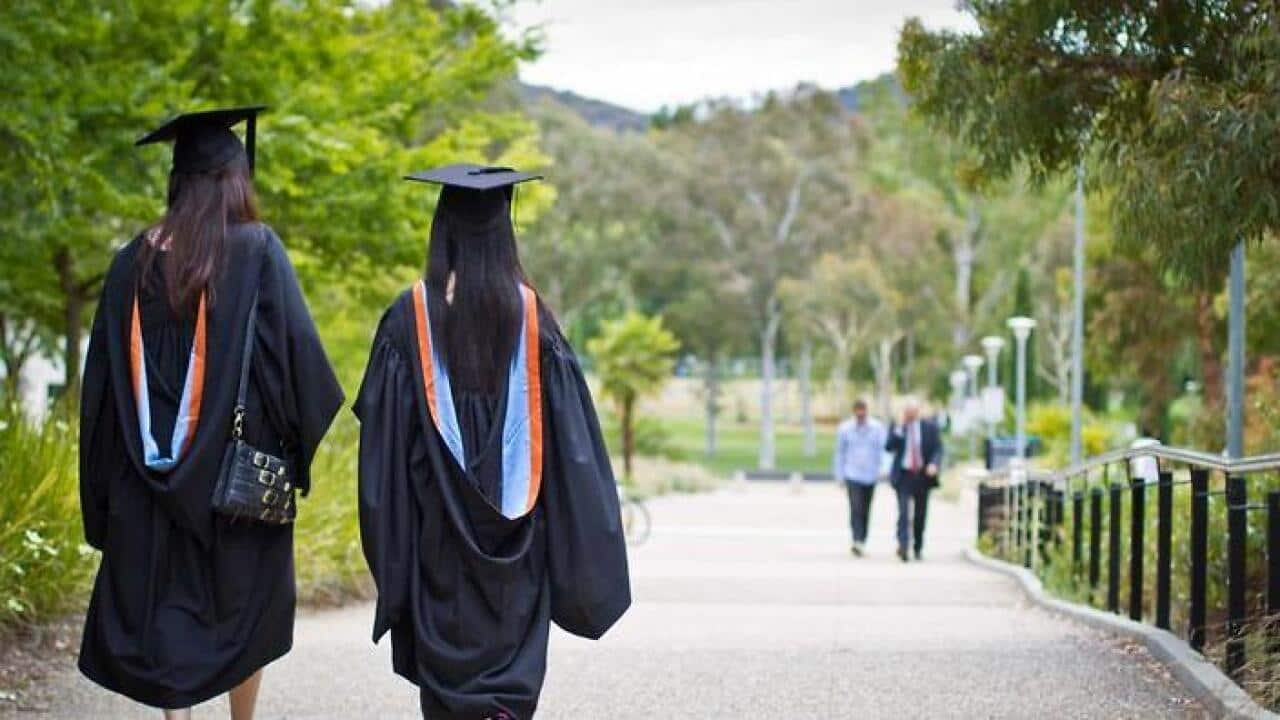Eighteen-year-old Matilda Boyce was the dux of her high school.
The bright New Zealander is enjoying her first year studying chemistry, geology and Japanese at the University of Western Australia.
But news of the Turnbull government’s new university reforms came as a shock to Ms Boyce’s family.
“If the changes are passed then we will probably leave Australia.”
Her course costs $9,000 per year under the current system, but would cost $36,000 per year under Education Minister Simon Birmingham’s proposal.
The new system, if changes pass the senate, will see New Zealand citizens and permanent residents pay full international student prices for Australian degrees.
The department says the changes will not affect the roughly 20,000 permanent residents and NZ citizens already enrolled.
University students to 'pay more'
But they could affect Ms Boyce’s younger brother Harvey, who is in Year 12.
“If the changes are passed then we will probably leave Australia,” Matilda’s mother Deidre Robb said.
“[He] was hoping to study environmental science/conservation land management next year. The cost of the fees will now make that impossible.”
The reforms are not all bad news for the New Zealand and permanent resident students, who will for the first time be eligible for government student loans, just like Australian students.
The government estimates access to HELP loans will actually act as an incentive to help bring more students to Australia.
“Access to student loans could attract some new students for whom upfront payment was a disincentive to study, leading to an estimated 60,000 additional EFTSL [equivalent full-time students],” the Turnbull government’s reads.
But Ms Boyce says her family, and many others, would prefer to pay a smaller fee upfront than be shackled with a large student debt.
“I would have had $100,000 or more in debt,” she said. “You’re never going to be able to travel or buy a house or get ahead in life with that sort of debt.
“The enrolment rate’s just going to plummet for many universities.” The president of a student society for New Zealanders at the University of Melbourne said the changes would have a "big impact" on the 480 New Zealanders currently studying at the university.
The president of a student society for New Zealanders at the University of Melbourne said the changes would have a "big impact" on the 480 New Zealanders currently studying at the university.

Matilda Boyce was the dux of her high school Source: Courtesy: Matilda Boyce
While the changes would not affect their current courses, the university encourages a two-step process where students first undertake a generalist degree, then a more specialised one.
"We're disappointed. It came out of nowhere," the club's president Jordan Zheng told SBS News.
Mr Zhang is himself in his final year of a commerce degree, but says he would not be able to afford a planned law degree next year if the changes go ahead.
"We're hoping the senate blocks it," he said.
Rebecca Pacey, another New Zealand citizen, now faces the possibility that her planned PhD at the University of NSW next year, which would have been absolutely free under a Commonwealth supported placement, could now cost hundreds of thousands of dollars to complete.
"My fees just went from literally $0 to $126,000 if this bill is (to be) passed," Ms Pacey said.
"I work 30 hours a week in the work force, paying tax. If this bill passes I pretty much can’t afford to do it. And it’s disgusting that I should have a $126,000 HECS debt if I want to."
The Oz Kiwi community group, which represents New Zealanders living in Australia, is urging its members to write to their local MPs and voice opposition to the reforms.
The group’s spokeswoman, Joanne Cox, described the news as a “blindside”, and said their members had reacted with “anger, frustration and confusion”.
The changes also drew criticism from New Zealand’s Prime Minister Bill English.
“We're pretty unhappy about it,” he said.
“We want a serious discussion with them about where they're headed with this policy, rather than announcements that are made either without telling us or with short notice.”
New Zealand’s Foreign Minister Gerry Brownlee will travel to Australia next week for meetings with his Australian counterpart Julie Bishop.
The criticism comes just weeks after Mr English described the Australian government’s changes to immigration as “disappointing”.
Permanent residents now need to wait four years before they can apply to become Australian citizens, and Immigration Minister Peter Dutton confirmed there would be no exemption for New Zealanders.
Emma Freeman is one NZ citizen impacted by both the citizenship and university reforms.
She was due to be eligible for citizenship later this year and was planning to enrol in a medical degree at the University of Queensland after completing her undergraduate course.
Now, she faces choice between waiting four years or paying the full $280,000 fee for the degree.
"It's such a tough position to be in," she said. "I really do see my future in Australia, but I definitely don't want to be saddled with a huge debt," she said.
"I'm also worried that while I wait around as a permanent resident for the next four years, more rights for permanent residents - Medicare, or Centrelink, perhaps - may be cut."
"My family, and other Kiwis we have spoken too, are just feeling this massive uncertainty about our futures in this country now. What if we get another three years in and then permanent residents have to be here 10 years to become citizens?"





